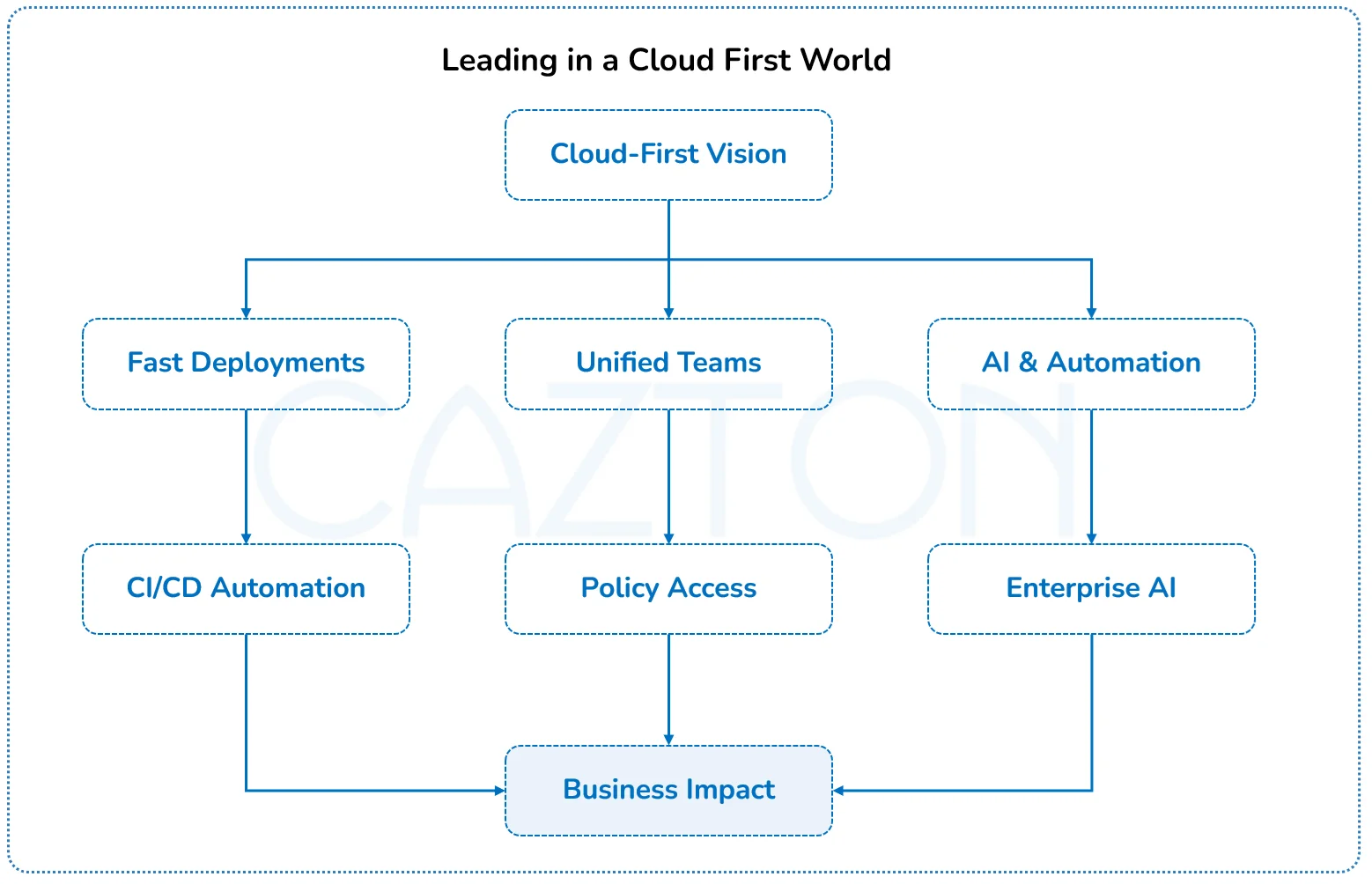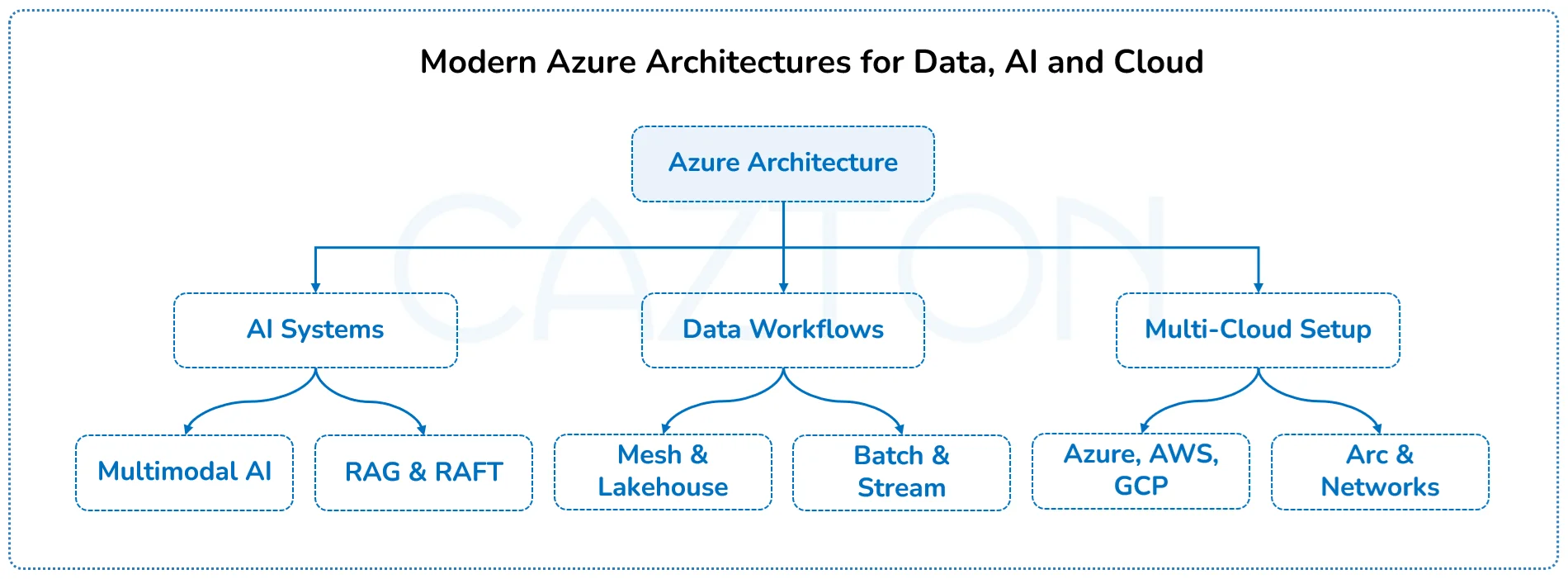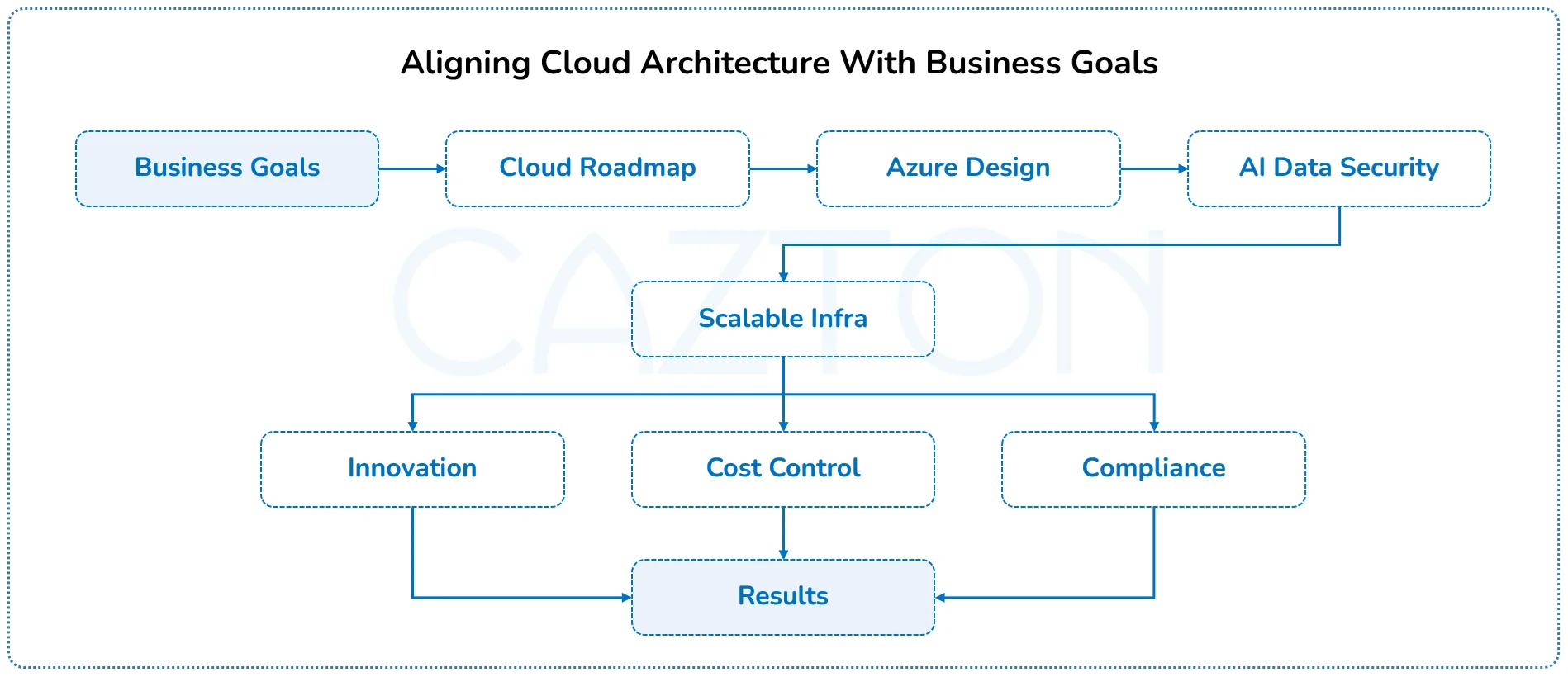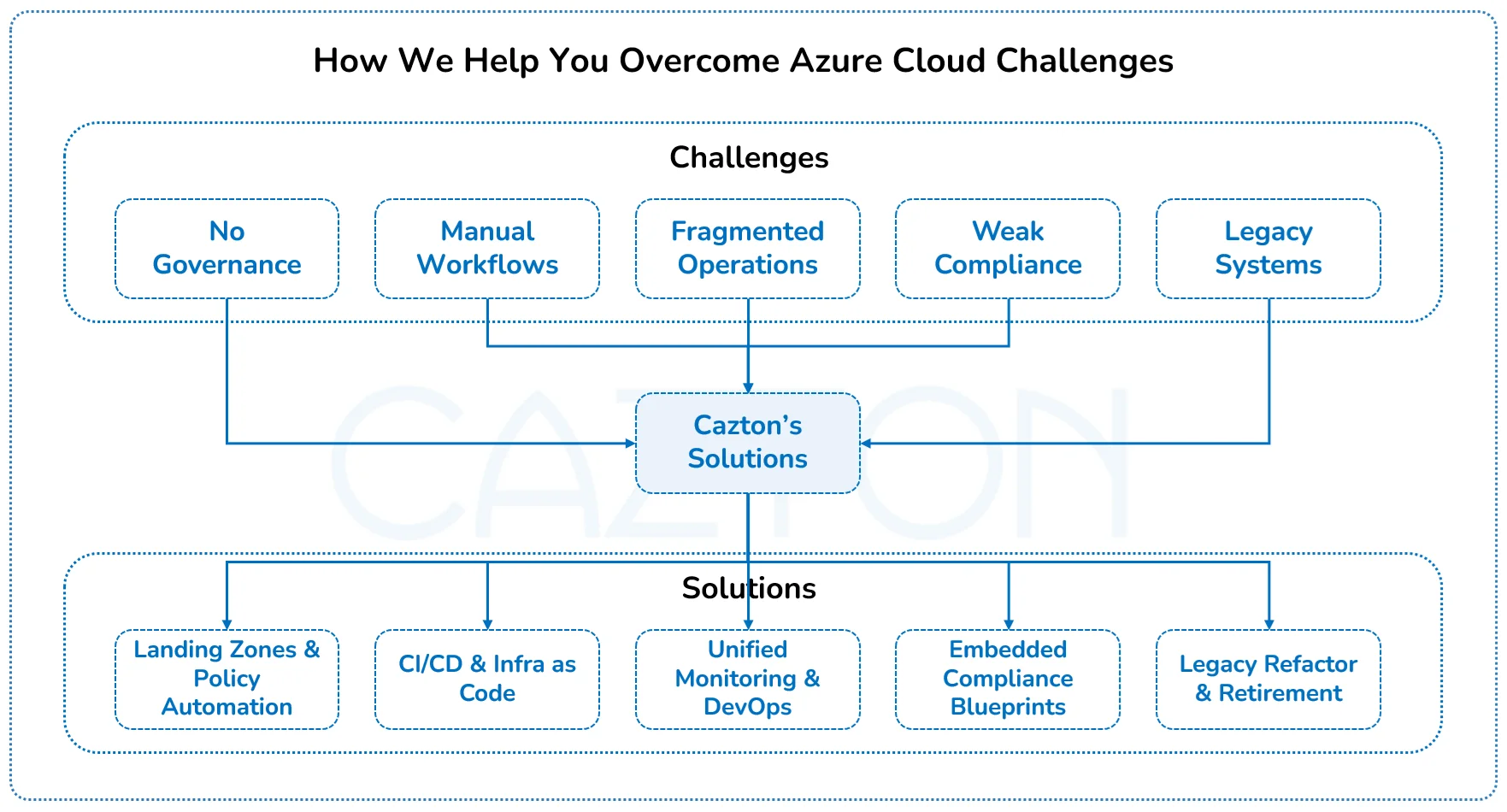Azure Consulting
- Why Azure should be part of your strategy: Azure supports hybrid, AI-driven, and data-intensive transformation at enterprise scale. We help convert these capabilities into measurable business outcomes.
- Work with a team of experts: Our team includes Microsoft awarded Most Valuable Professionals, Azure Insiders, Docker Insiders, ASP.NET Insiders, Web API Advisors, Cosmos DB Insiders with deep hands-on experience delivering enterprise solutions.
- AI solutions built for the Azure ecosystem: We design multi-agent, multimodal, and RAG-based AI systems using Azure-native tools. Each solution is explainable, secure, and production ready.
- Early access and insight into cutting-edge AI capabilities: We work closely with OpenAI, Azure OpenAI and many other Microsoft teams, giving you early visibility into emerging technologies. That means faster adoption and smarter execution.
- From architecture to operations, we deliver end-to-end value: We design Azure environments that align with your business goals and support post-launch success through automation, enablement, and optimization.
- Turn disconnected data into usable intelligence: We implement lakehouse and mesh architectures that unify access, remove silos, and make your data available for real-time decisions and AI.
- Trusted by global leaders across industries: We build tech solutions for top Fortune 500s, global enterprises, and high-growth startups across sectors. Our clients include Microsoft, Google, Broadcom, Dell, Bank of America, Thomson Reuters, and more - organizations that demand both innovation and accountability.
The pressure to modernize IT infrastructure is accelerating across industries, driven by the need for agility, scalability, and cost efficiency. Among the major cloud platforms, Microsoft Azure has established itself as a core component of many enterprises’ digital transformation strategies. With a market share estimated between 22% and 25%, Azure is widely adopted by both large enterprises and mid-sized organizations, including 85% of Fortune 500 companies reflecting its maturity, broad service offerings, and integration with existing enterprise systems.
For organizations exploring cloud options, Azure often becomes part of the conversation due to its alignment with hybrid cloud models, compliance needs, and deep integration with Microsoft’s productivity tools. Its rapidly evolving AI offerings including machine learning services, cognitive APIs, and integration with tools like Azure OpenAI Service also make it a compelling choice for businesses looking to accelerate innovation through artificial intelligence. However, the platform's breadth can present challenges around governance, cost management, and optimal architecture design.
At Cazton, we focus on helping organizations make sense of the complexity. Our role isn’t to sell a platform; it’s to deliver outcomes. We bring deep, hands-on expertise with Azure’s ecosystem, gained through years of collaboration with Microsoft product teams and contributions to the open-source community. Our consultants include Microsoft-awarded Most Valuable Professionals (MVPs), Azure Insiders, Docker Insiders, Web API Advisors, and other leading technologists with a proven track record of enabling high-impact cloud solutions.
Whether you’re planning a migration, building cloud-native applications, or optimizing your existing Azure footprint, our approach ensures technology serves your business, not the other way around.
Are You Prepared to Lead in a Cloud-First World
Are your launches and recoveries consistently fast and seamless, or do manual deployments and one-off fixes continue to derail your deadlines? Can your security, compliance, and development teams move as quickly as the market and regulators demand, without shadow IT, runaway costs, or compliance headaches? Are you using all of Azure’s industry-leading AI, data, and automation services to create measurable advantage, or do overlapping tools and skills gaps result in untapped potential?

True digital transformation depends on getting more than the right tools; it's about aligning processes, talent, and vision from the board to the frontlines. Our approach turns Azure adoption into a structured, value-driven journey. Through strategic planning, automation, enablement, and iterative change management, we help ensure that every business leader, IT professional, and data scientist sees tangible benefits in their daily work.
Enterprise leaders who “win” with Azure don’t settle for checklist migration; they invest in upskilling, automation, and managed governance, enabling every team to deliver, secure, and scale new products and insights. With Cazton at your side, you’re equipped with the roadmap, mentorship, and operational confidence needed to lead in a cloud-first world.
Modern Architectures for Data, AI, and Cloud
Modern enterprises demand architectures that are flexible, intelligent, and secure by design. Success with Azure requires more than simply adopting cloud services; it calls for reference patterns that support business agility, data accessibility, and responsible AI.
We help organizations move beyond one-off deployments toward integrated, future-ready platforms that enable sustainable growth and innovation. Whether you're modernizing legacy systems, building AI-powered workflows, or managing hybrid environments, the right architectural foundation makes the difference.

Accelerating Innovation Through Responsible AI
Azure now enables enterprise-grade multi-agent AI architectures through its AI Agent Service. This includes orchestrated agents that can perform analysis, automate tasks, or deliver conversational interactions, all coordinated through frameworks like Semantic Kernel, AutoGen, LangChain, LlamaIndex and others, and built on emerging standards such as Model Context Protocol (MCP) and Agent-to-Agent (A2A) communication. These agents can securely interact with enterprise data through services like Azure AI Search, Microsoft 365 Copilot, SharePoint, and Fabric workflows, enabling scalable, modular, and compliant AI solutions that align with enterprise complexity.
We design AI systems that move beyond narrow use cases and deliver multi-modal capabilities across audio, video, image, and text. From voice AI applications to retrieval-augmented generation (RAG) and routing-based frameworks like RAFT, our implementations are built for real-world scale and business relevance. Whether supporting document processing, customer service automation, or AI-driven content workflows, we apply architectural rigor, lifecycle control, and deep domain understanding to ensure each solution delivers responsibly.
Responsible AI isn’t just about features; it’s about outcomes. Our work includes embedding identity, security, compliance, and cost governance into every deployment, along with evaluation frameworks that continuously test models for performance, bias, and drift. These AI evals provide transparency and oversight throughout development and operations. Through proven reference patterns and targeted enablement, we empower teams to innovate safely, govern effectively, and scale AI with confidence.
Turning Data into an Enterprise Asset
We architect data platforms that support real-time, batch, and API-driven workloads using Azure services like Synapse, Data Lake, Azure Cosmos DB, Power BI, and Fabric. These platforms often integrate with big data technologies such as Apache Spark, Kafka, Hadoop, and Databricks to handle scale, velocity, and advanced analytics use cases. Our data mesh and lakehouse patterns ensure that every domain can discover, govern, and use data confidently across analytics, AI, and operational workflows without the bottlenecks of legacy pipelines or centralized control.
We embed security and governance directly into the data lifecycle using tools like Azure Active Directory, Defender, Key Vault, and Policy. Encryption, access control, identity management, and audit readiness are baked into every layer of the architecture. This approach helps meet regulatory standards while giving teams faster, safer access to the data they need to deliver results.
We lead phased modernization from traditional virtual machines to platform services like Azure App Service, Azure Functions, and Azure Kubernetes Service for containerized microservices. Each milestone is supported by DevOps automation, integrated security scanning, and performance baselining. This ensures a smooth transition with less disruption and stronger long-term value from your application estate.
Designing for a Multi-Cloud, Hybrid Future
We design reference architectures that span Azure, AWS, GCP, on-premises systems, and edge deployments. Azure Arc, hybrid networking, and cloud-native connectors help ensure consistent policy enforcement, workload mobility, and platform governance across environments. Our solutions address disaster recovery, latency optimization, and data residency requirements from the start. In multi-cloud scenarios, we also support integration with external platforms such as Snowflake for data warehousing and real-time analytics at scale.
We equip every engagement with structured documentation, interactive dashboards, as-built architecture visuals, and role-specific upskilling plans. This enables your teams to confidently operate and evolve in complex environments without relying on long-term external support. Whether you're planning a cloud migration, optimizing providers, or scaling regionally, we help lay the foundation for future-ready infrastructure and self-sufficiency.
How to Align Cloud Architecture with Business Strategy
Azure continues to evolve as a foundational platform for digital transformation supporting everything from VM migration and hybrid cloud adoption to containerized workloads and AI-powered applications. With over 200 enterprise-grade services spanning compute, security, data, IoT, AI, and DevOps, Azure is engineered to align with real-world business operations rather than impose rigid vendor patterns.
We help organizations harness Azure’s full potential by designing architectures that are flexible, governed, and ready for scale. Our expertise spans the platform's entire stack, enabling seamless transformation and continuous innovation across the enterprise.

Here’s how we architect Azure as a business-aligned engine:
- Resilient infrastructure foundation: We leverage Azure’s global footprint, spanning 60+ regions and 160 edge sites, to build secure, high-availability environments with optimized compute, networking, storage, and replication strategies.
- Modular cloud-native services: Our solutions use the right combination of services such as Azure App Service, AKS, Cosmos DB, Azure Functions, Synapse, and the Azure AI/OpenAI ecosystem to deliver tailored applications, APIs, and data pipelines.
- End-to-End security and governance: We implement built-in tools like Azure Policy, Defender, Monitor, Purview, Sentinel, and Azure Arc to manage access, monitor threats, enforce compliance, and control costs across hybrid and multi-cloud environments.
- Seamless business alignment: Our architectures are guided by business priorities, whether it’s launching new product lines, entering new markets, enabling AI-driven insights, or meeting strict regulatory requirements with confidence and agility.
- Sustainable transformation enablement: We go beyond infrastructure to support legacy modernization, SaaS readiness, DevOps transformation, and continuous upskilling across technical and leadership roles ensuring Azure becomes a catalyst for long-term innovation.
We help translate boardroom priorities like speed, ROI, and agility into platform-driven results. Our Azure work spans legacy modernization, SaaS enablement, DevOps transformation, and upskilling across all levels to build a foundation for sustainable innovation.
Core Azure Features That Power Enterprise Growth
- AI and automation enablement: We help teams accelerate value creation with Azure AI and ML, enabling model training, rapid prototyping, process automation, and operational integration. Our solutions ensure that AI is secure, explainable, and embedded in everyday workflows.
- Comprehensive security everywhere: We design and implement full-spectrum security using Azure Defender, Sentinel, network policies, and private endpoints. Threats are identified, mitigated, and responded to before they affect customers, helping to protect your brand and data assets.
- Identity, access, and zero trust security: We streamline identity management using Azure AD, PIM, and conditional access to enforce least-privilege access, unify user provisioning, and support secure collaboration. This enables faster onboarding, better compliance, and reduced risk exposure.
- Full regulatory compliance and blueprints: We use Azure’s extensive compliance portfolio, GDPR, HIPAA, PCI, FedRamp and more to deploy pre-validated architectures that cut onboarding time and reduce audit complexity for regulated industries.
- Monitoring, observability, and cost governance: Using tools like Azure Monitor, Log Analytics, and Cost Management, we deliver unified dashboards, automated alerts, and spend insights. This enables faster response to issues, optimized performance, and better financial control.
- Unified data governance and self-service: We implement Azure Purview and Data Lake solutions that catalog, classify, and secure enterprise data while enabling analytics teams to discover and use data confidently. Governance is balanced with innovation and usability.
- Cloud-native DevOps and automation: We build secure and scalable pipelines using Azure DevOps, GitHub Enterprise, Bicep, and Terraform for infrastructure and release automation. This accelerates product delivery and reduces manual intervention across the SDLC.
- Hybrid cloud and Azure Arc management: We deploy and govern hybrid and multi-cloud workloads using Azure Arc, allowing centralized policy enforcement, automation, and compliance across distributed environments without operational silos.
- Global reach, resilience, and disaster recovery: We architect solutions with geo-redundancy, cross-region failover, and automated disaster recovery to ensure business continuity, even under extreme conditions. Availability and performance are consistent across markets.
- Modern SaaS and marketplace readiness: We help organizations launch scalable, secure SaaS offerings on Azure, optimized for cost and marketplace integration. Teams can bring products to market faster and scale globally with confidence.
Why Most Azure Cloud Initiatives Stall and How to Build Real Value
Cloud adoption does not automatically lead to transformation. Many organizations stall after initial migrations due to predictable but avoidable pitfalls. Our delivery model focuses on pragmatic architecture, hands-on execution, and ongoing optimization to help you sustain momentum and realize long-term value.

- Missing governance and blueprinting: Without structured landing zones, policy frameworks, and resource segmentation, cloud platforms become difficult to secure and expensive to scale. We embed governance, access control, and cost boundaries directly into infrastructure using code, templates, and automation, so every environment is traceable, compliant, and ready for growth.
- Security and identity overlooked: Weak identity management, inconsistent permissions, and manual secrets handling create risk across the stack. Our security accelerators enforce zero trust principles and automate monitoring, incident response, and threat detection. Identity, access, and audit logs are aligned to your org chart and compliance profile from day one.
- Fragmented hybrid and multi-cloud operations: Running across Azure, AWS, GCP, and on-prem often leads to disconnected tooling, inconsistent visibility, and slower recovery. We design unified control planes and service monitoring patterns that span platforms, streamline DevOps, and enable faster resolution across teams and providers.
- Manual processes and DevOps bottlenecks: Spreadsheets, manual provisioning, and patching workflows hinder agility. We implement CI/CD pipelines, infrastructure as code, and release automation to ensure consistency, auditability, and rapid delivery. Teams adopt patterns like canary releases, blue green deployment, and policy enforcement without extra overhead.
- Compliance and audit exposure: Fast delivery should not come at the expense of regulatory alignment. We build controls directly into the platform using proven templates, automated reporting, and continuous validation to simplify audit cycles and reduce risk across regulated industries.
- Legacy systems never fully retired: Partial migrations leave technical debt, split architectures, and rising costs. We complete the loop with modernization roadmaps that include migration, refactoring, and decommissioning, backed by measurable business cases and operational plans.
- Lack of continuous optimization: Cloud success is not a one-time event. We run scheduled reviews, cost and usage audits, architectural retrospectives, and roadmap tuning to ensure your platform evolves with your business and maintains its competitive edge.
This approach results in resilient, well-governed, high-performing environments that meet both technical and business requirements. From the first blueprint to long-term operations, we help you move faster, manage smarter, and lead with confidence.
Case Studies
Modern Risk and Regulatory Platform
- Challenge: A global financial enterprise managing complex portfolios across regions faced systemic barriers to timely compliance, risk modeling, and executive reporting. Data was trapped in disconnected systems with nightly syncs and heavy manual processes, making it nearly impossible to act quickly on changing regulations or real-time risk signals. Siloed teams were dependent on outdated workflows that limited collaboration and transparency across departments.
- Solution: We rebuilt the data and reporting backbone to enable faster ingestion, streamlined modeling, and self-serve analytics with zero manual dependencies. New architecture provided traceability, encryption, and automation for audit and governance. Teams shifted from reactive compliance work to proactive, insight-led decision-making across the enterprise.
- Business impact: Regulatory teams were able to respond with greater agility. Risk analysis became a shared, real-time capability rather than a back-office process. Business leaders gained operational clarity and confidence in their data.
- Tech stack: Azure Synapse, Azure Cosmos DB, Microsoft Fabric, Data Lake Gen2, Power BI, Event Hubs, Azure Policy, Azure Monitor, Azure DevOps, Data Factory, REST APIs, Apache Spark.
Global Marketplace Acceleration
- Challenge: A globally distributed retailer with complex product catalogs and regional dependencies struggled to maintain consistent customer experiences. Integration between systems was fragile, resulting in delays during peak events and misaligned updates across mobile, web, and in-store touchpoints. Teams across geographies were disconnected from central platforms, often working around the system rather than with it.
- Solution: We delivered a unified experience layer with scalable services and global deployment pipelines to align teams, reduce technical debt, and cut feedback loops. Product teams could now test and release features independently while maintaining brand and system consistency. Inventory workflows were fully automated, enabling real-time responsiveness across channels.
- Business impact: Product teams launched experiences more confidently across regions. Customer journeys became smoother and more personalized. Operations improved through better visibility and aligned digital workflows.
- Tech stack: Microservices, Azure API Management, React.js, .NET, SQL Server, Azure Cache for Redis, Docker, AKS, Azure AI Search, Azure DevOps, GitHub Actions, Application Insights, Data Lake Gen2.
Secure Data Sharing and Clinical Analytics
- Challenge: A large healthcare organization spanning hospitals and clinics operated with isolated systems for patient records, clinical operations, and research. Data privacy requirements further complicated access and sharing, making it difficult for care teams to generate insights, collaborate across sites, or comply with evolving regulations. Existing analytics efforts were fragmented and reactive.
- Solution: We unified disparate clinical and operational data into a governed ecosystem with structured pipelines and secured data access layers. Real-time and historical data became available to analysts and physicians without compromising compliance. Executive and clinical teams could now collaborate around a shared, trustworthy data foundation.
- Business impact: Clinical insights became more accessible and actionable. Care teams worked more efficiently across locations. Data-driven innovation became easier to achieve while staying aligned with privacy mandates.
- Tech stack: Azure Purview, Data Lake Gen2, Azure Databricks, Synapse, Docker, AKS, Azure AD, Data Factory, Azure Cognitive Services, TensorFlow, PyTorch, Azure Cosmos DB for MongoDB, Python, HL7 FHIR APIs, Power BI.
360-Degree Data Platform and Personalization
- Challenge: A media and content organization with streaming services faced growing challenges in unifying data from subscriber behavior, content delivery, and campaign performance. Disparate systems made experimentation slow and unreliable. Business teams lacked a single, trusted view of real-time and historical trends, hindering growth, monetization, and agility in a competitive market.
- Solution: We unified telemetry, campaign data, and engagement analytics into a central platform with structured reporting and personalization capabilities. Experimentation velocity increased as marketing and engineering shared a single version of truth. Content teams were now empowered to act on real-time signals and run campaigns confidently.
- Business impact: Marketing and content teams moved from assumptions to evidence-based decisions. Campaigns became more responsive and better aligned with user behavior. The business gained agility across creative, technical, and operational teams.
- Tech stack: Azure OpenAI, Apache Kafka, React Native, Blazor, ElasticSearch, Azure Fabric, Synapse Analytics, Data Lake Gen2, Docker, AKS, Azure Functions, Event Hubs, Azure Logic Apps, Power BI, KQL, Azure DevOps, Python, Azure Blob Storage.
Intelligent Operations at Scale
- Challenge: A logistics and supply chain organization faced operational bottlenecks due to disconnected systems managing routing, billing, asset tracking, and vendor interactions. Teams relied on spreadsheets, emails, and ad hoc data pulls to keep operations running. Despite having access to rich sensor and telemetry data, there was no unified platform to act on it in real time.
- Solution: We created a unified operating platform for intelligent logistics, connecting edge devices, billing processes, and analytics into a responsive, event-driven backbone. Automated workflows replaced spreadsheets, and real-time decision-making became a built-in advantage. Teams could now scale growth without increasing complexity or headcount.
- Business impact: Teams operated with greater confidence and less manual intervention. Visibility improved across the full supply chain, enabling faster and better decision-making. Operations scaled more predictably and efficiently.
- Tech stack: Azure OpenAI, Azure AI, Apache Spark, Azure Functions, Swift, Lambda Architecture, Azure IoT Hub, Stream Analytics, Azure Cosmos DB, Data Lake Gen2, Azure Service Bus.
How Cazton Can Help You With Azure
At Cazton, we bring together deep technical expertise and business transformation experience to deliver cloud implementations that drive measurable outcomes. Our approach goes beyond technology to address the organizational, process, and people aspects of successful cloud adoption.
We understand that Azure implementation isn't just about migrating workloads; it's about transforming how your business operates. Our team works closely with your stakeholders to understand your unique challenges, constraints, and opportunities. We then develop tailored solutions that leverage Azure capabilities to address your specific business needs.
- Cloud strategy and roadmap alignment: We help define business-aligned Azure strategies that prioritize agility, compliance, and innovation across your organization. Our roadmaps provide clarity from executive goals to delivery milestones.
- Architecture and modernization blueprints: We design flexible, secure, and scalable Azure reference architectures that support modernization of legacy systems, containerization, and cloud-native development across hybrid and multi-cloud environments.
- AI and multi-modal solution design: We build responsible, enterprise-ready AI systems across text, audio, image, and video modalities. Our work includes multi-agent orchestration, RAG and RAFT frameworks, and evaluation pipelines for governance and observability.
- End-to-end data platform engineering: We create unified data platforms using mesh and lakehouse patterns that serve analytics, AI, and operational workloads. Our work spans streaming, batch, and API-driven pipelines across structured and unstructured data.
- Security, identity, and zero trust implementation: We embed security controls, role-based access, policy enforcement, and zero trust frameworks across your Azure footprint, enabling compliance and breach prevention by design.
- Governance, compliance, and blueprint automation: We codify policies, regulatory controls, and landing zones into automated templates. Our compliance-first approach reduces risk and simplifies audit readiness in regulated industries.
- DevOps and infrastructure automation: We implement everything-as-code pipelines for infrastructure, applications, identity, and monitoring. Our patterns accelerate delivery, enable rollback, and increase platform consistency across environments.
- Cost optimization and FinOps enablement: We enable visibility into cloud spend with dashboards, budgets, and guardrails. Our reviews and adjustments ensure resource efficiency without compromising performance or resilience.
- Hybrid and multi-cloud operations: We architect and operate hybrid and multi-cloud environments spanning Azure, AWS, GCP, Snowflake, and on-premises systems. Our work includes identity federation, network integration, and consistent policy enforcement.
- Cloud-native SaaS and marketplace readiness: We guide you through productizing internal innovation, launching scalable SaaS platforms on Azure, and onboarding to the Azure Marketplace to unlock new revenue streams.
- Change management and team enablement: We support long-term adoption through architecture documentation, dashboards, upskilling plans, and embedded coaching to make your teams cloud-capable and self-sufficient.
No matter where you are on your Azure journey, whether building new platforms, modernizing legacy systems, or scaling securely across clouds, we help you move faster, operate smarter, and lead with confidence. Contact us now to build something that drives real business value.
Cazton is composed of technical professionals with expertise gained all over the world and in all fields of the tech industry and we put this expertise to work for you. We serve all industries, including banking, finance, legal services, life sciences & healthcare, technology, media, and the public sector. Check out some of our services:
- Artificial Intelligence
- Big Data
- Web Development
- Mobile Development
- Desktop Development
- API Development
- Database Development
- Cloud
- DevOps
- Enterprise Search
- Blockchain
- Enterprise Architecture
Cazton has expanded into a global company, servicing clients not only across the United States, but in Oslo, Norway; Stockholm, Sweden; London, England; Berlin, Germany; Frankfurt, Germany; Paris, France; Amsterdam, Netherlands; Brussels, Belgium; Rome, Italy; Sydney, Melbourne, Australia; Quebec City, Toronto Vancouver, Montreal, Ottawa, Calgary, Edmonton, Victoria, and Winnipeg as well. In the United States, we provide our consulting and training services across various cities like Austin, Dallas, Houston, New York, New Jersey, Irvine, Los Angeles, Denver, Boulder, Charlotte, Atlanta, Orlando, Miami, San Antonio, San Diego, San Francisco, San Jose, Stamford and others. Contact us today to learn more about what our experts can do for you.


